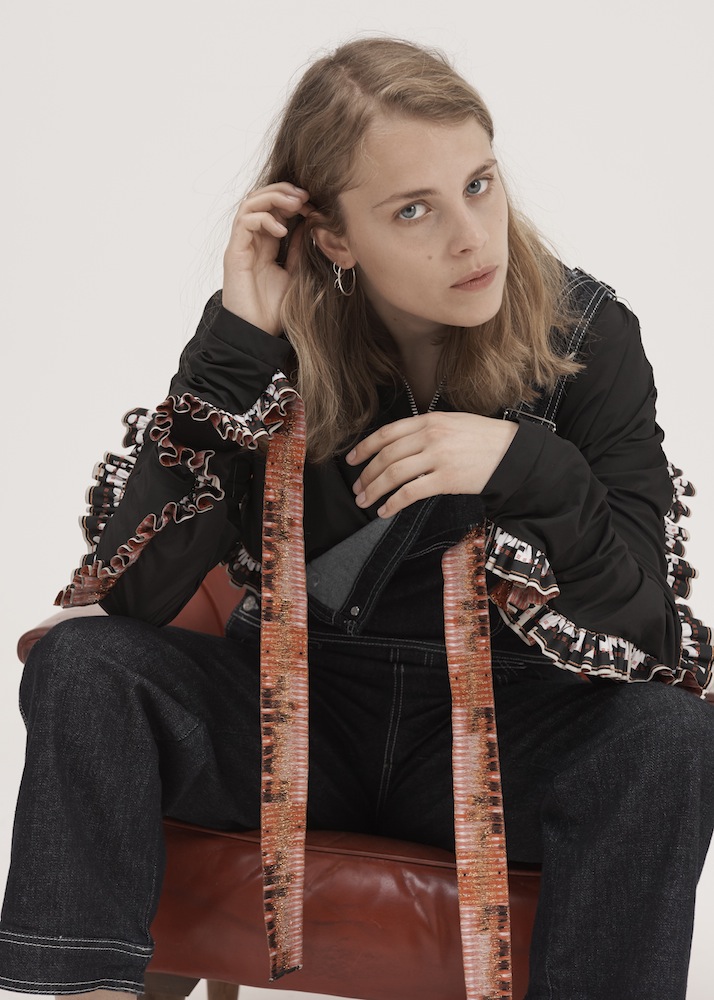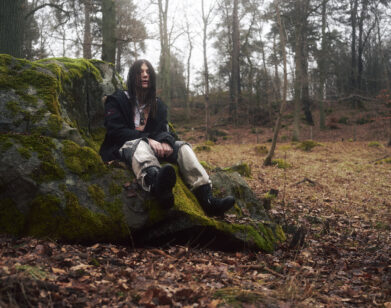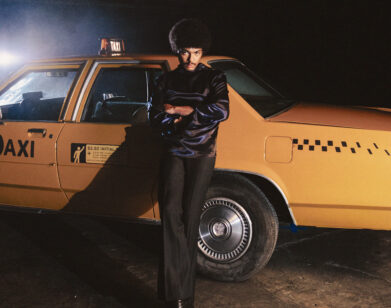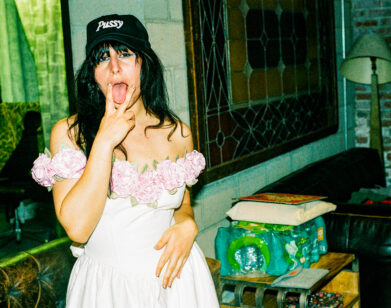Marika Hackman
“I had been on the road touring the first record, and then I came back and I took a very long, deep breath for a year whilst writing,” says Marika Hackman. It’s a predictably rainy day in London when we call the 25-year-old musician, and she’s at home readying to tour the result of that extended inhale and exhale: I’m Not Your Man (Sub Pop), her sophomore album. Released last month, it’s equal parts passionate and introspective, and follows the arc of a relationship from its lusty beginning (“Boyfriend”) to “breaking down completely at the end,” says Hackman (“I’d Rather Be With Them”). It’s also a shift away from the folk-leaning sound of her 2015 debut We Slept At Last; on I’m Not Your Man she embraces alt-rock’s sense of urgency, and in it, finds the ability to speak matter-of-factly. If this new direction came as a shock to listeners, it too came as a surprise for Hackman’s long-time producer Charlie Andrew (alt-J, Sivu). But, as Hackman explains, change is what one should expect of her, as it’s what she expects of herself.
“If you’re stuck in a rut doing the same thing over and over again, what are you actually, really achieving?” she says. “I’m someone who strives for success, for self-growth and new experiences, and to make a record that pushes me out of my comfort zone is something that’s really exciting. It means you’re making new decisions, you’re making bold decisions, you’re being scared, and you’re getting through that—hopefully making something you’re proud of, or being in a better position that makes you feel stronger as a human being.”
Over the weekend Hackman kicked off her North American tour; she’s joined by Mercury Prize-nominated group the Big Moon, which was also her backing band on I’m Not Your Man. They arrive in Brooklyn on August 16 at Baby’s All Right.
HALEY WEISS: What has the general reaction to the album been like?
MARIKA HACKMAN: It’s been really good, actually. I was not worried, but I was intrigued to see how it was going to go down because obviously it is a different sound. I thought that maybe people who were big into my first record might be like, “What’s she done? I don’t like this new direction,” or, “This isn’t the Marika that I got on board with the first time around.” But everyone’s really got it and appreciated the change in direction. The directness of this record seems to be the thing that gets mentioned the most; people are responding to it really well. Also, I think people understand that as a songwriter, there are still many elements in the songs on this record that resonate with stuff on the first one, and I think that’s because of the way that I write music. It’s just that I’ve treated it in a much different way [this time].
WEISS: Some of it’s still quite surreal lyrically speaking, even though it’s a bit more direct.
HACKMAN: Definitely. There are moments on songs like “Violet” where it’s still shrouded in metaphor, but it’s quite, I don’t know, explicit. [laughs] And then there are songs like “Boyfriend,” where obviously it’s straight up, very, very simple. It’s fun to play around with words; I really enjoy doing that, so I don’t think I’ll ever stop, but it’s also been nice to have messages on there that I can say flat out and that people appreciate.
WEISS: What’s the greatest compliment or criticism you’ve received of the album—something someone said that really stuck with you?
HACKMAN: There was a criticism that stuck with me a little bit, which is that somebody said that I was jumping on a bandwagon by talking about sexuality. Obviously that’s not a massive takedown, but I found that personally quite offensive because it’s something that I’ve been living with and dealing with my whole life, and just because I decided to speak about it now is not me jumping on a bandwagon; it’s a reflection of how I feel within this industry and how I’ve grown in the past five years. I think he might’ve thought that I was doing a Katy Perry “I kissed a girl and I liked it” kind of thing rather than actually talking about my own personal experiences. But then to be fair, he got taken down pretty hard by a bunch of my fans and then he took it back.
WEISS: That’s so ridiculous in the context of the straight, male rock bands that have talked about their sexuality for decades.
HACKMAN: I know, right? I think the reason that stuck with me was because I found it so frustrating, but actually, that’s kind of been the only proper negative feedback that I’ve had. Then in terms of compliments, I just can’t really remember them because you always tend to stick on a bit more the negatives, don’t you?
WEISS: Would you consider yourself a self-critical person?
HACKMAN: Yeah, massively. I’m self-critical but also, I’m not a very modest person. [laughs] I’m self-critical in the lead-up to showing anyone anything. You know how people say they write, like, 30 songs and then they’ll pick the ones they’re going to put on the record? I don’t ever get to that point because I self-edit so harshly at the beginning. I would never let anyone hear something that I wasn’t happy with. But then once I’ve made it, I’m also not going to turn around and go, “Oh, yeah, I don’t know…” If I’m putting it out, anything creative that I do, I think that it’s good, otherwise I wouldn’t put it out. But I am self-critical across the board and in other areas of my life, I think.
WEISS: How fully formed are your songs by the time you bring them to a producer, show someone lyrics, or play them for someone?
HACKMAN: Like, completely finished. Lyrics are the last thing that I would do, so a couple of the lyrics I will be finishing in the studio behind Charlie last minute because we’ve got to get the vocals recorded. I sometimes find lyrics quite difficult towards the end, but [it’s done] musically in terms of the structure, in terms of the arrangement, particularly for this record—arrangements for the last record we did in the studio, but the arrangements for this one I did first on my computer. So it’s all fully formed. I have no one else involved in the writing process. I would hate to feel that I was going into the studio with something wishy-washy and not done. It’s because I’m a control freak, so I want to know that everything is sorted and what’s going to come out the other end, obviously with a bit of leeway.
WEISS: What has the experience been like playing these songs live? Because they are quite different in sound than your past music.
HACKMAN: It’s just been really fun. It’s the music I always imagined myself playing when I was a kid. It’s been nice to use my instrument a bit more—play the guitar in a more fun way with riffs and stuff like that—rather than just propping up a whole song with a guitar and my vocals. There’s so much more energy in the crowd as well; they’ve been bouncing around and having fun, and it’s nice to feel like you’re a part of something in a room rather than just performing for a crowd. So I’ve enjoyed it loads, and it’s also been an exciting challenge, because obviously I still enjoy playing the old stuff, but I’m not going to do a song like “Ophelia” on an acoustic guitar in the middle of a set that I have now—it would be totally incongruous. I have been taking older material and basically giving it a bit of a rejig and making it sound like it could’ve potentially belonged on this record, which has been really fun.
WEISS: I’d be curious to hear if there are particular shows that stand out in your mind as important memories—a really great show or a really bad show.
HACKMAN: On a tour the big London show is always going to be very exciting. A couple of weeks ago I played Heaven in London, which is the biggest show I’ve ever headlined. That was a real moment, and it was playing all the new material. It was amazing to see the shift and hear everyone singing everything back; it’s stuff that I’ve never experienced before. That felt like a turning point and made me excited for the rest of this year and next year as well, for all the touring that’s going to come. But there have been smaller shows in my life where I’ve been a bit overwhelmed by it. I did the Great Escape [Festival] when I was about 20, and it was the first time I did a show where it was one in, one out. It was really exciting; it’s one of those moments where everything seems to click and fall into place. But bad shows, it’s always the support shows, isn’t it? Especially when it’s been me with a guitar struggling to fight against the noise of the crowd that just doesn’t give a shit—that’s always quite soul-destroying.
WEISS: I imagine festivals often must feel like that for musicians. Every time I go to one I’m like, “This cannot be the best context for people to hear music.”
HACKMAN: Yeah. If you get a buzzy, vibe-y crowd, then it’s exciting and people tend to be very up for it; it’s quite intense. But I did a show a couple of weeks ago at Best Kept Secret in the Netherlands, so obviously we flew out there—we got a flight at 5 A.M.—we got there, and I was clashing with Arcade Fire, who were headlining the Saturday night. And because I got booked quite late I wasn’t even in the program, so you can imagine that show maybe wasn’t my favorite. [laughs] But it was cool, because there were a few people there, and it grew as we carried on playing. By the end, it did feel full, and the people that were there were really up for it, so that was nice, and they were shouting loads of encouraging things. But if you travel all that way, and then you’re clashing with Arcade Fire, it’s kind of like, “Ah, fuck.”
WEISS: Have you always been a confident performer? Has that been a part of this that you’ve enjoyed throughout?
HACKMAN: I’ve really grown into that. I was an incredibly, incredibly shy performer when I first started. I played my first show when I was 16 and I did my first tour when I was 19, and I remember those shows, I couldn’t eat before I went on. I wouldn’t drink because I was scared that might affect it. I’d be shaking on stage and my voice would be wobbling, and I was absolutely terrified. That’s intense if you’re playing shows one after the other for three weeks. Then I kind of grew into that, just me playing on my own with a guitar, and I got so comfortable doing that, having done it for about four years, that I craved a bit of a challenge. That’s why I like putting this new sound together as well: it’s also been exciting because it’s been really refreshing. I thought I was going to get nervous again because it’s a whole new thing, but all the shows have been fun. I’m glad that those nerves haven’t come back. [laughs] Now I’m confident, but I certainly was not like that to start. I’m a completely different performer than I was back then.
WEISS: I feel like it’s an impressive thing to play a show at age 16 in the first place. You were playing original material then?
HACKMAN: Yeah. I started performing at school when I was 13, 14; that was the first time I started playing stuff, just singing in front of anyone. It was stuff I’d written at home on my own. Then somehow I got booked for a show in London when I was 16—absolutely terrified. But it was a really fun night in some scuzzy little club, and all my friends came, and we were all underage—we weren’t legally supposed to be there, I shouldn’t have even been playing that show. Then I went back to school and was doing my A-levels and studying, and when I was 18 I started gigging again. It’s funny, it was a very masochistic experience because it was so terrifying. I never had singing lessons, I never had guitar lessons, so I never felt like I was a competent performer in either of those things; that’s been a learning curve.
WEISS: What do you think you’ve learned about yourself as a creative person, having put yourself out there for a few years now?
HACKMAN: I released my first track when I was 20, so I’ve been releasing music for five years. Obviously if I look back at the songs I was writing when I was effectively a child, there’s a big contrast, so I’ve learnt a lot along the way. I think it’s a confidence thing; the biggest thing that’s affected me, both in writing and performing, is a growth in confidence. With my first EP, [That Iron Taste (2013),] which came out a couple of years ago, I was really pushing the melodies and harmonies as much as I could because I didn’t want to sound like anyone else; I wanted it to be quite strange and weird. This time around I learnt that actually, it’s okay to just let it come out and see how that happens, and not to try and force it to have a point of difference, that maybe I have that anyway in the way that I write.
I’M NOT YOUR MAN (SUB POP) IS OUT NOW. FOR MORE ON MARIKA HACKMAN AND UPCOMING TOUR DATES, VISIT HER WEBSITE.







